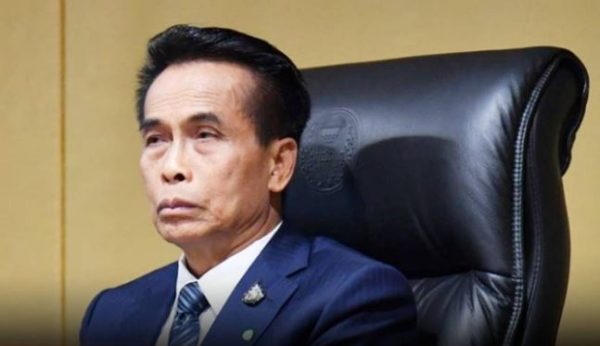Anwar Salaeh, the Democrat fighting for party’s return to anti-authoritarian roots

While for outsiders Anwar Salaeh is a rebel MP, most of his fellow Democrats consider him a black sheep for his role as an opponent of both his party and the government it supports.
The 50-year-old politician from Pattani has been a headache for Democrat leader Jurin Laksanawisit ever since the party joined the military-backed Prayut Chan-o-cha government after the 2019 election. Not only does Anwar criticize the government while urging his party to quit the coalition and to restructure, he has also voted against the Democrat Party line on important occasions.
Last week, the vocal critic of the party asked its executives and members nationwide to withdraw from the government coalition. His move came after the Constitutional Court ruled Deputy Agriculture and Cooperatives Minister Thammanat Prompow could stay in office and continue as an MP despite the four years he spent in an Australian jail following his 1994 conviction for smuggling heroin.
“I place the full blame on Prayut. He appointed Thammanat [as minister] despite knowing his background,” said Anwar, who is also the Democrats’ deputy secretary-general.
“Prayut is unlikely to resign [as demanded by opposition parties]. Hence, I suggest the Democrats take this opportunity to resolve the country’s crisis by pulling out [of government] to pave way for a change under the democratic mechanism,” Anwar said, referring to the need for a new election if the government coalition collapses.
His proposal was abruptly dismissed by Jurin, who said any party decision must be made by the majority. He added that the Democrats cannot leave the government at a time when it had to unite with the people to tackle COVID-19 and the economic crisis.
Revolt against Democrat leader
Anwar and a few of his party mates form a minority opposed to 2014 coup-leader Prayut’s reappointment as PM, which they say prolongs military power after the putsch. They say their intention is to restore public trust in Thailand’s oldest political party. The Democrats performed disastrously in the 2019 general election, dropping from 159 seats to 52 in Parliament.
A censure debate in February saw Anwar abstain from the vote on his party leader, who was being grilled in his roles as Commerce Minister and Deputy Prime Minister. Anwar complained that Jurin had given an unclear answer and deserved a warning. He also slapped deputy minister Thammanat with a vote of no-confidence over the distribution of Sor Por Kor land.
Prior to the vote, Anwar insisted he would follow his own conscience and listen to people’s voices.
“The Democrat Party of yesteryear gained popularity by fighting against authoritarianism. I want to do everything to improve the [modern] party’s image,” he said.
Historically, the Democrat Party has been seen as a counterbalance to military regimes in Thailand.

Initially, Democrat politicians declined to support him for fear it would ruin their chances of being selected as MP candidates, said Anwar. However, he had received more backing within the party recently, he added.
Anwar was among 17 Democrat MPs who opposed voting for Thammanat in the February 2020 censure debate before reluctantly toeing his party’s line to back the controversial government figure.
He then called on Jurin to convene an extraordinary general meeting to review its decision to support Prayut’s government after a close aide of Thammanat was accused of involvement in the hoarding of 200 million face masks amid severe shortages. The meeting should also discuss how to stop the “bleeding” after certain key Democrat figures quit, he said.
His move was seen as a bid to shake up the leadership amid dissatisfaction at Jurin’s performance.
Power base in South
The four-time Pattani MP was the sole Democrat MP elected in the three southernmost provinces in 2019, after the party won nine seats in the previous election.
After graduating in business administration from Ramkhamhaeng University, Anwar worked at a real estate firm in Bangkok for three years before returning to his hometown to work at his father’s construction firm.
The Pattani native was first elected as MP for his home province in 2005 under the Democrat’s banner. Anwar prospered after voters turned against then-premier Thaksin Shinawatra’s Thai Rak Thai (TRT) Party over the Tak Bai massacre in 2004. The 2005 election saw the Wadah group, Muslim politicians whose grip on the deep South had lasted more than 20 years, run under the TRT banner and lose their stronghold.
By Thai PBS World’s Political Desk






